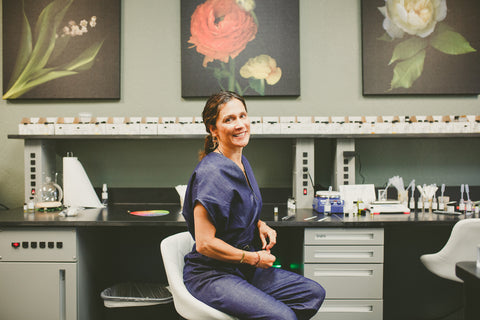The Naturals vs. Synthetics Debate

When I first went into perfumerie, I believed that everything had to be natural. I had heard about the danger of parabens and phthalates, and thought that synthetics should be avoided at all cost. But a little more research taught me that you can both harvest nature’s best scents and ingredients, and use synthetics to expand your range, while preserving the environment we care about.
The truth is, natural scents are limited, and at times unpredictable. I wanted to offer my customers more than the same lavender or vetiver scent they could get anywhere else, while creating a product that I could feel safe wearing and giving my friends and family.
One of my first forays into using synthetics came out of my desire to capture the complexity of the California Coast in a bottle. I wanted a scent that could evoke the ocean breeze, and found Calone, an oceanic, salty, watery scent that reminds me of swimming amongst the algae.
If I had wanted to create the same complex scent using only natural ingredients, I would have needed to use ambergris (which comes from sperm whales and is extremely expensive) and kelp, which would add instability and change its odor profile over time. Whereas Calone is a light, ethereal scent that lifts a perfume and adds sillage (the lingering of a scent), essential oils would make the perfume heavier, flatter, and less complex.
In my perfume classes, I learned about the IFRA (International Fragrance Association) standards, which test and categorize synthetic scents for safe use in perfumes around the world. The US doesn’t have regulatory standards for fragrance, which means there are dangerous synthetic compounds out there. I follow the European standards, which opens up an entire world of fragrances I could have only dreamed of, while assuring that my fragrances are safe and ethically sourced.
Synthetics are also often more sustainable than their natural counterparts. Sandalwood for instance can now be replicated without cutting any trees. Musk, a scent used in lots of perfumes for its woodsy, sexy smell, used to come from musk deer genitals, and had to be extracted in a cruel and violent way. Now, the scent has been replicated synthetically, and that same scent can be used cruelty-free.
At ThereThen we are committed to creating fragrances that are clean, safe, local, cruelty-free, and environmentally-conscious. We respect our customers enough to be fully transparent, so you can make the best decision for yourself.

Comments
0 Comments
Leave a Comment